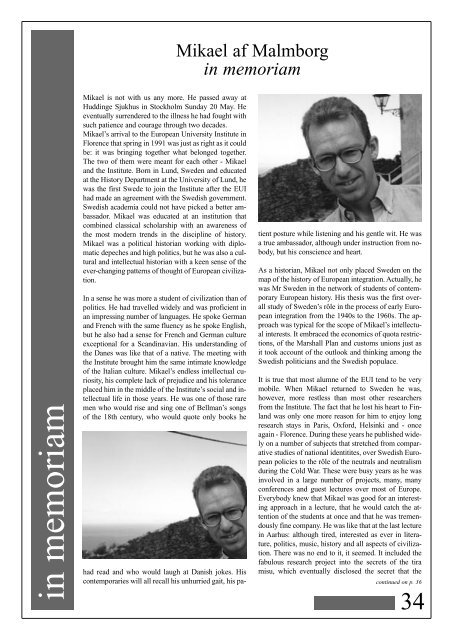History - European University Institute
History - European University Institute
History - European University Institute
You also want an ePaper? Increase the reach of your titles
YUMPU automatically turns print PDFs into web optimized ePapers that Google loves.
in memoriam<br />
Mikael is not with us any more. He passed away at<br />
Huddinge Sjukhus in Stockholm Sunday 20 May. He<br />
eventually surrendered to the illness he had fought with<br />
such patience and courage through two decades.<br />
Mikael’s arrival to the <strong>European</strong> <strong>University</strong> <strong>Institute</strong> in<br />
Florence that spring in 1991 was just as right as it could<br />
be: it was bringing together what belonged together.<br />
The two of them were meant for each other - Mikael<br />
and the <strong>Institute</strong>. Born in Lund, Sweden and educated<br />
at the <strong>History</strong> Department at the <strong>University</strong> of Lund, he<br />
was the first Swede to join the <strong>Institute</strong> after the EUI<br />
had made an agreement with the Swedish government.<br />
Swedish academia could not have picked a better ambassador.<br />
Mikael was educated at an institution that<br />
combined classical scholarship with an awareness of<br />
the most modern trends in the discipline of history.<br />
Mikael was a political historian working with diplomatic<br />
depeches and high politics, but he was also a cultural<br />
and intellectual historian with a keen sense of the<br />
ever-changing patterns of thought of <strong>European</strong> civilization.<br />
In a sense he was more a student of civilization than of<br />
politics. He had travelled widely and was proficient in<br />
an impressing number of languages. He spoke German<br />
and French with the same fluency as he spoke English,<br />
but he also had a sense for French and German culture<br />
exceptional for a Scandinavian. His understanding of<br />
the Danes was like that of a native. The meeting with<br />
the <strong>Institute</strong> brought him the same intimate knowledge<br />
of the Italian culture. Mikael’s endless intellectual curiosity,<br />
his complete lack of prejudice and his tolerance<br />
placed him in the middle of the <strong>Institute</strong>’s social and intellectual<br />
life in those years. He was one of those rare<br />
men who would rise and sing one of Bellman’s songs<br />
of the 18th century, who would quote only books he<br />
had read and who would laugh at Danish jokes. His<br />
contemporaries will all recall his unhurried gait, his pa-<br />
Mikael af Malmborg<br />
in memoriam<br />
tient posture while listening and his gentle wit. He was<br />
a true ambassador, although under instruction from nobody,<br />
but his conscience and heart.<br />
As a historian, Mikael not only placed Sweden on the<br />
map of the history of <strong>European</strong> integration. Actually, he<br />
was Mr Sweden in the network of students of contemporary<br />
<strong>European</strong> history. His thesis was the first overall<br />
study of Sweden’s rôle in the process of early <strong>European</strong><br />
integration from the 1940s to the 1960s. The approach<br />
was typical for the scope of Mikael’s intellectual<br />
interests. It embraced the economics of quota restrictions,<br />
of the Marshall Plan and customs unions just as<br />
it took account of the outlook and thinking among the<br />
Swedish politicians and the Swedish populace.<br />
It is true that most alumne of the EUI tend to be very<br />
mobile. When Mikael returned to Sweden he was,<br />
however, more restless than most other researchers<br />
from the <strong>Institute</strong>. The fact that he lost his heart to Finland<br />
was only one more reason for him to enjoy long<br />
research stays in Paris, Oxford, Helsinki and - once<br />
again - Florence. During these years he published widely<br />
on a number of subjects that stretched from comparative<br />
studies of national identitites, over Swedish <strong>European</strong><br />
policies to the rôle of the neutrals and neutralism<br />
during the Cold War. These were busy years as he was<br />
involved in a large number of projects, many, many<br />
conferences and guest lectures over most of Europe.<br />
Everybody knew that Mikael was good for an interesting<br />
approach in a lecture, that he would catch the attention<br />
of the students at once and that he was tremendously<br />
fine company. He was like that at the last lecture<br />
in Aarhus: although tired, interested as ever in literature,<br />
politics, music, history and all aspects of civilization.<br />
There was no end to it, it seemed. It included the<br />
fabulous research project into the secrets of the tira<br />
misu, which eventually disclosed the secret that the<br />
continued on p. 36<br />
34

















